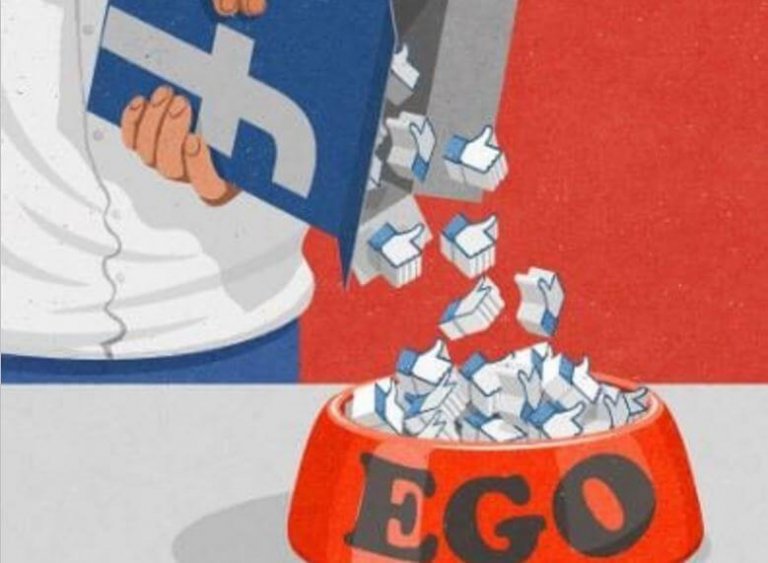I Like Social Networks, Not Fake Virtual Lives

Social networks are nothing more than an alternative channel of communication. They’re used for sharing information and interacting in a different way with people that are either far away or form a part of our everyday lives. It is a useful, dynamic tool which allows us to receive information in an instant. Also, social networks show off aspects of ourselves that would otherwise be complicated to share.
Sometimes social networks can saturate us and sometimes they are fun. Other times, we wish we could disappear from them for a while without anyone noticing, and reappear in them the same way. We don’t always find the truth in them, but that happens in any medium of communication or in any social interaction.
“Facebook came about to give people the power to share and make the world a more open and connected place.”
-Mark Zuckerberg-
Social networks can be fun, useful and emotionally positive if you know how to use them, just like with any other technological tool. However, there is a strong affective component in them. Everything associated with social acceptance and the validation we obtain from the people who matter to us.
All of that can transform a social network into a showcase of lies. Virtual lives that hold no correlation to the real life of the individual behind the computer screen.
From fun to slavery, all for a virtual image
Few of us know the limit between portraying a pleasant image on social media and becoming a false version of ourselves. While the desire to please people is something logical and understandable, not knowing how to establish limits to what we do in a virtual medium can bring out emotional issues, identity problems and restlessness.
Here are some points which can serve as warning signs:
- Not establishing an appropriate filter of privacy for friends, acquaintances and strangers. If we show everyone the same amount of information, we are likely exposing too much of ourselves to a medium with infinite connections between users, with all of the risks this implies.
- Sacrificing our sincerity for a handful of “likes”. Many people post certain things, and become saddened or feel devalued if they don’t receive a certain amount of likes. Far from managing these emotions, many choose to befriend an unknown number of strangers. Or never eliminate users with which they have no relation to. Or many might even choose to share some conflicts due to the hope that one of their photos will be able to surpass what they consider “popular” or “successful”. Be it a nicely decorated meal or a relaxing walk along the mountains, receiving likes, even if it’s from people they don’t even know, gives their self-esteem a huge boost.

- Proving that you have a lot of friends at all costs: You fill your photos with filters, smiling faces, of the exaltation of friendship. We have all at some point posted this type of photo, when we can’t even stand the person standing next to us. Or, when in reality we were having a really bad day. This is the “light” version, what we call “post-worthy”. But, you may start arranging meetings or parties that don’t appeal to you on a personal level only to seem like an socially active person. You might be in debt and, even so, plan a trip only to show off your “active lifestyle”.
- The risk of what’s explicit. Each one of us is free to show the world the sentimental relationships we so choose. But if you show off each one of your ideal encounters, people might think it is odd. These “ideal labels” will translate over into scenes from “Kramer vs. Kramer” in real life. Showing a lie on a social network, regarding your friends and family can make people start to distrust you. They might not take you seriously or may directly consider you someone with a lack of self-esteem and character.
- Declarations of love and eternal friendship that aren’t accompanied by interest in your real life away from the computer. If two friends like each other, any medium is good enough to show it. But certain people may feel saturated by receiving dozens of public declarations of friendship on social media, and all of this before a huge audience. However, they can’t count on that person when they truly need them.
- Making your ex-partner jealous, even if you’re with someone new you dislike or don’t care about. Some people are desperate to show they’re “the first ones to get back on the horse” after a breakup. They do so by altering the course of relationships they have with other people. By always trying to take photographs to show their ex that they “won”.
- To simulate glory and joy when you in reality you feel defeated. Showing that we’re delighted by our jobs, travels, children, friends and partners. Doing this can lead us such a degree of hypocrisy, it implies not making important decisions. Hence, keeping up the facade.

We believe that maintaining a “perfect” virtual life will make certain people jealous. But the truth is that for them maybe your profile is completely irrelevant. Keeping up a farce, no matter what we truly want to change in our lives.
The emotional implications of a fake virtual life
The less sincere you are in your virtual interactions, the more of a prisoner you become of them. You can post, comment, interact, but always try to make your behavior online reflect who you really are.
You might not get “200 likes” every time, but you’ll like receiving loving comments from people you actually appreciate. People you do have a bond with or who were special to you at some point in your life and remain so to this day. Even with time and distance lying between you.
And that’s why I like for my social networks to be the most similar to what I actually enjoy. And I mean like, truly like, without having to click on it. I want to keep certain things for myself. Even more so, I don’t like to chat amicably with people who I don’t even wave at in real life.
I like social networks, but I don’t like virtual falsehood. I’m not interested in being a leader. Instead, I am interested in keeping my peace and my personality in the face of the tyranny of likes. Some time ago I found them entertaining, today I simply dislike them. Likes are merely something to count, not a gesture of liking nor pleasure.
Social networks are nothing more than an alternative channel of communication. They’re used for sharing information and interacting in a different way with people that are either far away or form a part of our everyday lives. It is a useful, dynamic tool which allows us to receive information in an instant. Also, social networks show off aspects of ourselves that would otherwise be complicated to share.
Sometimes social networks can saturate us and sometimes they are fun. Other times, we wish we could disappear from them for a while without anyone noticing, and reappear in them the same way. We don’t always find the truth in them, but that happens in any medium of communication or in any social interaction.
“Facebook came about to give people the power to share and make the world a more open and connected place.”
-Mark Zuckerberg-
Social networks can be fun, useful and emotionally positive if you know how to use them, just like with any other technological tool. However, there is a strong affective component in them. Everything associated with social acceptance and the validation we obtain from the people who matter to us.
All of that can transform a social network into a showcase of lies. Virtual lives that hold no correlation to the real life of the individual behind the computer screen.
From fun to slavery, all for a virtual image
Few of us know the limit between portraying a pleasant image on social media and becoming a false version of ourselves. While the desire to please people is something logical and understandable, not knowing how to establish limits to what we do in a virtual medium can bring out emotional issues, identity problems and restlessness.
Here are some points which can serve as warning signs:
- Not establishing an appropriate filter of privacy for friends, acquaintances and strangers. If we show everyone the same amount of information, we are likely exposing too much of ourselves to a medium with infinite connections between users, with all of the risks this implies.
- Sacrificing our sincerity for a handful of “likes”. Many people post certain things, and become saddened or feel devalued if they don’t receive a certain amount of likes. Far from managing these emotions, many choose to befriend an unknown number of strangers. Or never eliminate users with which they have no relation to. Or many might even choose to share some conflicts due to the hope that one of their photos will be able to surpass what they consider “popular” or “successful”. Be it a nicely decorated meal or a relaxing walk along the mountains, receiving likes, even if it’s from people they don’t even know, gives their self-esteem a huge boost.

- Proving that you have a lot of friends at all costs: You fill your photos with filters, smiling faces, of the exaltation of friendship. We have all at some point posted this type of photo, when we can’t even stand the person standing next to us. Or, when in reality we were having a really bad day. This is the “light” version, what we call “post-worthy”. But, you may start arranging meetings or parties that don’t appeal to you on a personal level only to seem like an socially active person. You might be in debt and, even so, plan a trip only to show off your “active lifestyle”.
- The risk of what’s explicit. Each one of us is free to show the world the sentimental relationships we so choose. But if you show off each one of your ideal encounters, people might think it is odd. These “ideal labels” will translate over into scenes from “Kramer vs. Kramer” in real life. Showing a lie on a social network, regarding your friends and family can make people start to distrust you. They might not take you seriously or may directly consider you someone with a lack of self-esteem and character.
- Declarations of love and eternal friendship that aren’t accompanied by interest in your real life away from the computer. If two friends like each other, any medium is good enough to show it. But certain people may feel saturated by receiving dozens of public declarations of friendship on social media, and all of this before a huge audience. However, they can’t count on that person when they truly need them.
- Making your ex-partner jealous, even if you’re with someone new you dislike or don’t care about. Some people are desperate to show they’re “the first ones to get back on the horse” after a breakup. They do so by altering the course of relationships they have with other people. By always trying to take photographs to show their ex that they “won”.
- To simulate glory and joy when you in reality you feel defeated. Showing that we’re delighted by our jobs, travels, children, friends and partners. Doing this can lead us such a degree of hypocrisy, it implies not making important decisions. Hence, keeping up the facade.

We believe that maintaining a “perfect” virtual life will make certain people jealous. But the truth is that for them maybe your profile is completely irrelevant. Keeping up a farce, no matter what we truly want to change in our lives.
The emotional implications of a fake virtual life
The less sincere you are in your virtual interactions, the more of a prisoner you become of them. You can post, comment, interact, but always try to make your behavior online reflect who you really are.
You might not get “200 likes” every time, but you’ll like receiving loving comments from people you actually appreciate. People you do have a bond with or who were special to you at some point in your life and remain so to this day. Even with time and distance lying between you.
And that’s why I like for my social networks to be the most similar to what I actually enjoy. And I mean like, truly like, without having to click on it. I want to keep certain things for myself. Even more so, I don’t like to chat amicably with people who I don’t even wave at in real life.
I like social networks, but I don’t like virtual falsehood. I’m not interested in being a leader. Instead, I am interested in keeping my peace and my personality in the face of the tyranny of likes. Some time ago I found them entertaining, today I simply dislike them. Likes are merely something to count, not a gesture of liking nor pleasure.
This text is provided for informational purposes only and does not replace consultation with a professional. If in doubt, consult your specialist.







